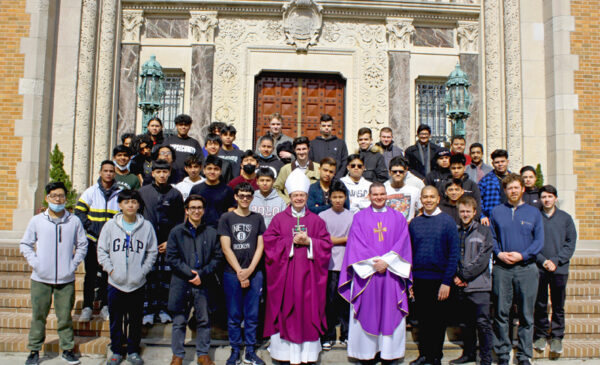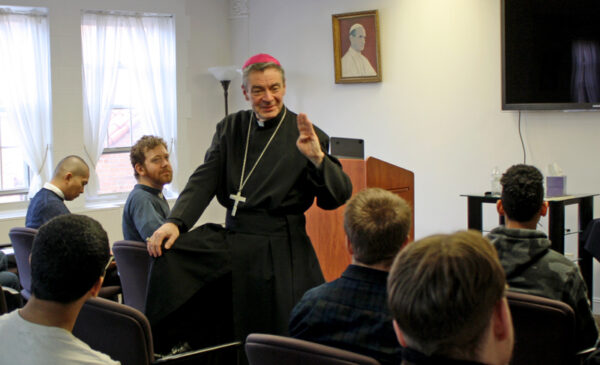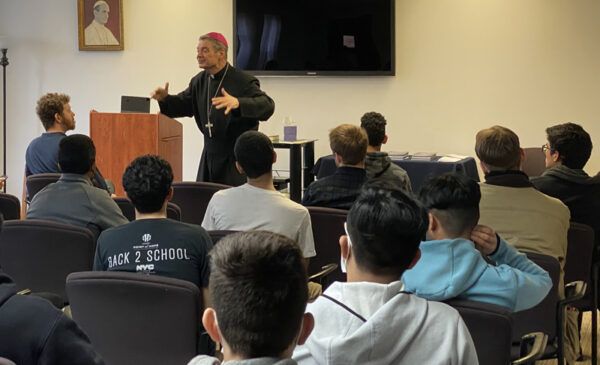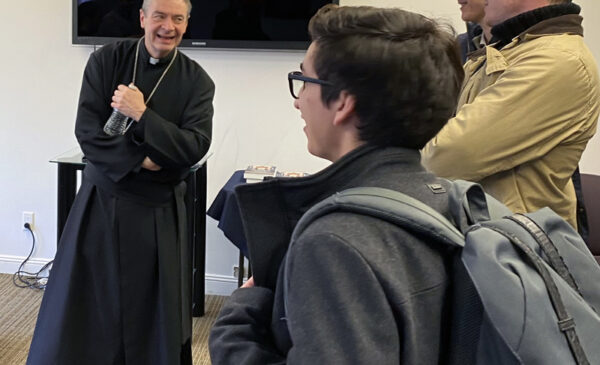Bishop Brennan Devotes Weekend to Encouraging Vocations, Discernment
HUNTINGTON, N.Y. — On Saturday, March 5, Bishop Robert Brennan returned to the campus of his seminary days, the Seminary of the Immaculate Conception in Huntington, New York, for his first Bishop’s Vocation Retreat since he was installed as Bishop of Brooklyn last November. Located on the north shore of Long Island, it is now a retreat and conference center in the Diocese of Rockville Centre.
The weekend retreat was attended by 39 young men — nearly all high school students — from the Diocese of Brooklyn, all seeking to discern if they have a calling from God to become priests.
Bishop Brennan is following the lead of his predecessor, Bishop Nicholas DiMarzio, in making a concerted effort to encourage young men to consider and pursue priestly vocations.
During a morning session, Bishop Brennan struck an encouraging tone with his youthful audience, encouraging them to search for Holy Scriptures on their smartphones.
Please pray for these young men of the @BrooklynDiocese on retreat this weekend asking God to help show them the path of life to follow! If in prayer they hear the Lord's call to discern priesthood or another vocation, they are an inspiration for us of being open to God’s Plan. pic.twitter.com/c9hEJNXZqj
— Bishop Robert Brennan (@bishopofbklyn) March 5, 2022
“You have a Bible in your pocket,” he said. “And you can take it wherever you go.
“Spend time with Jesus. Pray, and read the Bible. It’s a lot like reading social media. Jesus was way ahead of his time; a scripture reading is basically his post of the day.”
During a break, Bishop Brennan said, “I’m just continuing what Bishop DiMarzio did. I think a weekend like this is an investment that tells people this matters. And I think they noticed that, and they appreciate it.”
Father Chris Bethge, vocations director for the Diocese of Brooklyn, said Bishop Brennan’s decision “to take out an entire weekend, and dedicate it to the promotion of vocations — it’s a very beautiful thing.”
Father Bethge said Bishop DiMarzio sent a message to the retreat Friday evening to wish everyone well and say that he was praying for them.
Earlier in the day, Bishop DiMarzio told The Tablet that, considering the nationwide shortage of priests, making time for vocations is a critical priority.
“Young people today want to have a personal relationship with the bishop,” he said. “This is not the case of the past. We didn’t have the time or it wasn’t even considered important.
“But today, these young men need that relationship so they can discern and understand better.”
Bishop DiMarzio once famously called for a “full-court press” to nurture vocations.
“I called upon everybody to take vocations seriously. It’s a whole team focused on recruitment of vocations,” he recalled.
Bishop DiMarzio declared 2017 a Year of Vocations with a theme of “Reawakening the Call.”
He said he issued the challenge to inspire more young people to enter discernment, and for clergy to “create a healthier environment for vocations to be considered, encouraged, nourished and responded.”
He noted that 80% of men who lived at the House of Discernment “either became priests or are currently in the seminary.”
Bishop DiMarzio said all these efforts, especially the annual retreat, brought results. From his installation to retirement, he ordained 109 priests.
“All I know is it worked,” he said, adding, “the fact is, I ordained men who came from those retreats.”
Many of them are immigrants, which pleases Bishop DiMarzio, considering the multicultural makeup of the diocese. In recent years, new priests came from Caribbean countries, Africa, Asia, Central and South America, and Eastern Europe.
“In 1970, when I was starting out, you didn’t have a lot of foreign-born people in the first place,” Bishop DiMarzio said. “But, today, especially in our diocese, at least half are foreign-born.”
‘Nobody Asked Them’
Nevertheless, the nationwide shortage of priests, including in the Diocese of Brooklyn, is not easily dismissed. Bishop DiMarzio and Bishop Brennan commented that developing countries have better recruitment rates than the U.S.
“In the First World, we’re not doing as well as we did,” Bishop DiMarzio said. “We did our survey — it’s almost 10 years ago — with St. John’s University, and we asked young people why they have difficulty in saying ‘yes’ to vocations.
“First of all, (many said) nobody asked them. They didn’t feel comfortable telling anybody, so they just kept it a secret and let it go. We had 1,400 respondents, so it was a pretty good survey.”
Auxiliary Bishop James Massa, the rector at St. Joseph’s Seminary and College at Dunwoodie, Yonkers, mentioned another reason. The pandemic “certainly has created challenges for young people” by blocking their connections “with parish life, with their schools, and with those who would normally be assisting them in the discernment of a priestly vocation,” he said.
‘I’m on the Edge’
Still, formators pressed on, Bishop Massa said, adding, “Do we believe that God is calling young people to heroic lives as priests and religious? Yes, we do. But we can only create the environment in which a vocation is heard and supported. God plants the seeds. What we must do is prepare the ground.”
One retreat participant confirmed that discernment can be complicated and even stressful.
Chris Cajamarca, 17, said his mother, a native of Ecuador, nurtured strong faith in him.
“The religion carried on to me,” said the junior from Archbishop Molloy High School in Briarwood, Queens. “It’s something that’s been on my mind.” But also on his mind, he conceded, is the possibility that, if he becomes a priest, his family name won’t go forward. He has two sisters, one older, one younger.
“There are times when I don’t mind it,” he said. “But there are times when I think about it quite often. That’s why I’m on the edge, because I don’t want the family name to die.”
Another participant, Brian Hurley, 28, of Woodside, Queens, said the retreat, plus his attendance at the Jeremiah Project in February, helped ease his discernment stress.
“These two retreats together, back-to-back, have inspired me to really finally shake off the slough,” he said. “I’ve been dragging my feet with uncertainty. But now I feel ready.
“And if the priesthood isn’t for me, I’ll walk away from the seminary with a deeper faith, and a deeper understanding, which can only help me everywhere I go in life.”
Strong Catholic Men
Bishop Brennan has a reputation for supporting and encouraging seminarians. He has said it takes a lot of courage and generosity to become a priest, which makes them heroes.
“Presumably, and hopefully, there will be some who will want to be priests, but there also will be people from here who, I’m sure, are going to live as strong Catholic men,” he said. “They’ll be raising families that may be open to vocations. And they’ll be witnessing to their faith.”
Seminarians and formators at his last post, the Diocese of Columbus, Ohio, confirmed his commitment to building vocations.
Msgr. Joseph Hendricks, pastor of St. Brigid of Kildare, Ohio, and the former chancellor and vicar general for that diocese, told The Tablet last fall that Bishop Brennan strives to be “open, honest, transparent, and willing to help.”
Bishop Brennan told the participants Saturday that he knew many of them might not choose to be priests, but the retreat still had much to offer them.
Thus, he urged them to pray and study the Bible daily to build a growing friendship with Jesus Christ, who lovingly wants that with them.
“I thought that really showed a lot of integrity,” Hurley said of the Bishop. “It’d be really easy now to just give the sales pitch for the priesthood.
“But I think he sent a very strong message that he actually cares about the happiness and the welfare of the laity, not just to promote his motives or his status.”
Bishop DiMarzio’s Contributions to Vocations
Key vocations projects evolved during the tenure of Bishop DiMarzio (2003-2021), among them:
- The Annual Vocation Retreat: established in 2006.
- Pope John Paul II House of Discernment: opened to provide a prayerful community for men who have full-time jobs or are attending college to pursue the discernment process.
- Project Andrew: held eight times each school year for young men to meet with an auxiliary bishop, other priests, and seminarians for an afternoon of prayer, dinner, and discussions about the priesthood.
- Jeremiah Project: two-hour discussions held on scheduled Friday, Saturday, and Sunday evenings, six times each year (January through June), at Cathedral Preparatory School and Seminary in Elmhurst, Queens.
- The Year of Vocations: 2017, was set aside to reflect upon vocations, with Masses and prayers for seminarians and their teachers, the formators, and priests already ordained.
The Diversity of Diocesan Priests
Over the past decade, the Diocese of Brooklyn has ordained many priests who reflect its reputation as “The Diocese of Immigrants.” Here’s a breakdown showing the number of priests ordained, with their nationalities:
2012 Priests Ordained: 6
United States 5; Ukraine, 1
2013 Priests Ordained: 9
United States 4; Haiti, 3; Jamaica, 1; South Korea, 1
2014 Priests Ordained: 13
United States 8; Haiti, 2; Poland, 2; Italy, 1
2015 Priests Ordained: 10
United States 9; Poland, 1
2016 Priests Ordained: 10
United States 3; Haiti, 2; Poland, 2; Colombia, 1; Dominican Republic, 1; Nigeria, 1
2017 Priests Ordained: 10
United States 3; Nigeria, 2; Poland, 2; Cameroon, 1; Italy, 1; South Korea, 1
2018 Priests Ordained: 5
United States 2; Germany, 1; Haiti, 1; Vietnam, 1
2019 Priests Ordained: 4
United States 2; Colombia, 1; Nigeria, 1
2020 Priests Ordained: 4
Colombia, 2; Croatia, 1; United States 1
2021 Priests Ordained: 4
Dominican Republic, 2; Vietnam, 2




